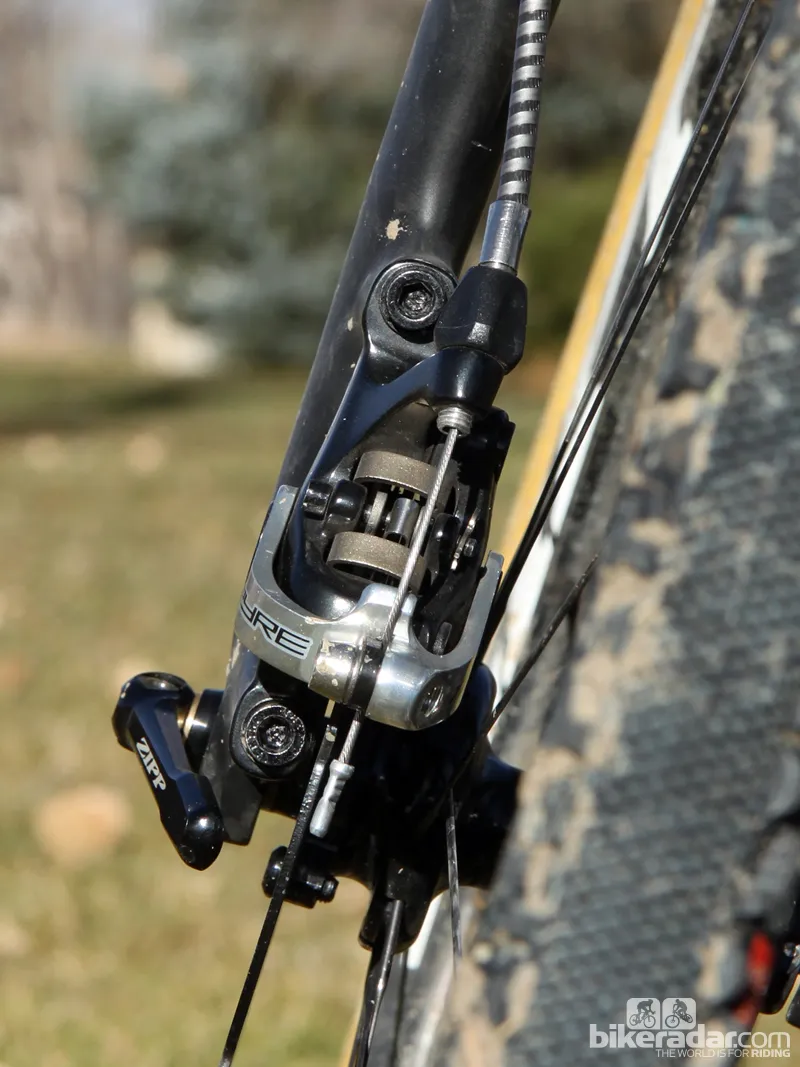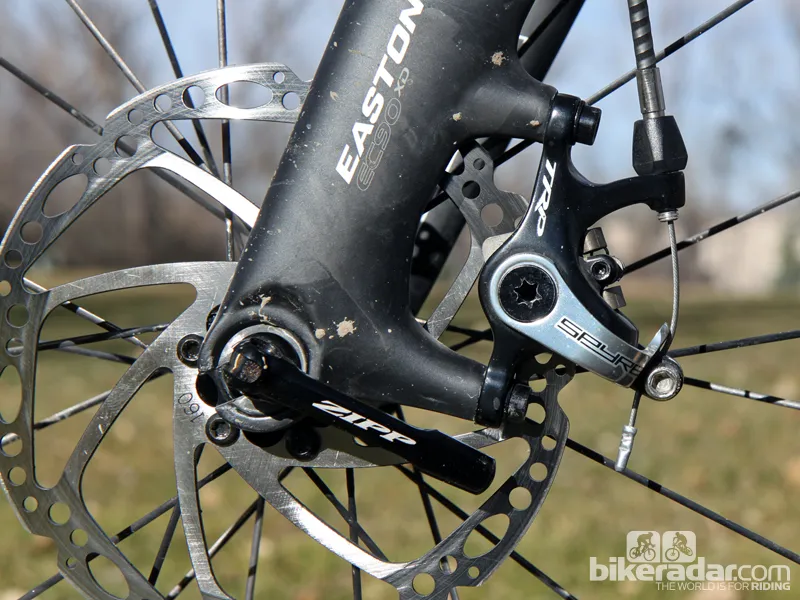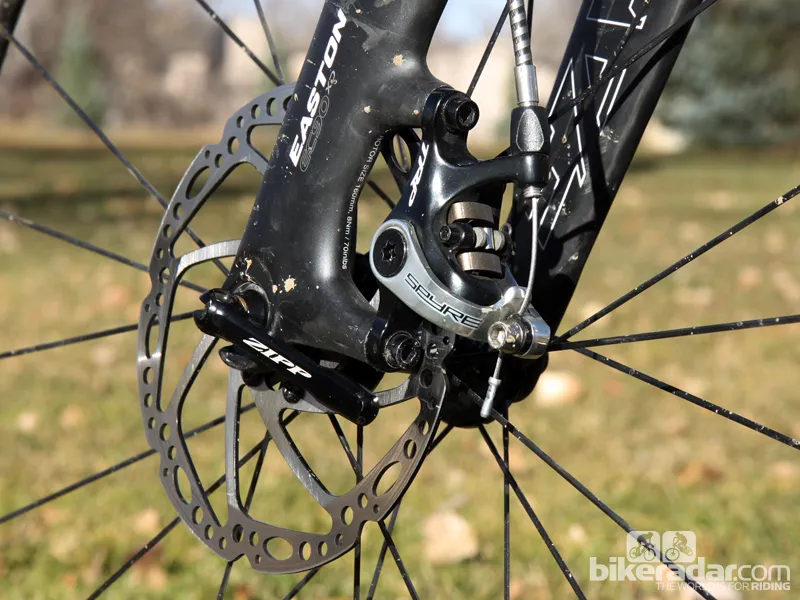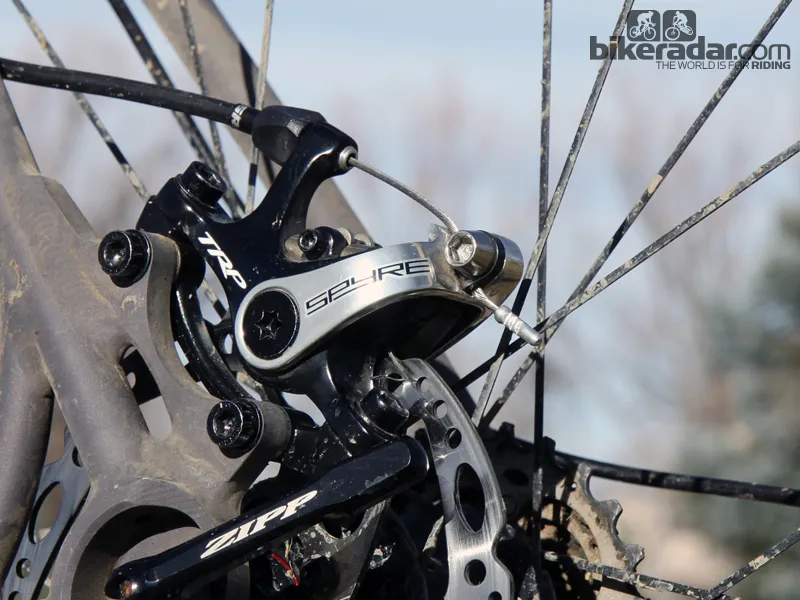Full-hydraulic disc brakes may be the future for road and cyclocross bikes but there are few options in the here and now. Countless mechanical levers are already out there though, and TRP hopes to take advantage of that with its all-new Spyre brake. Recent revisions have improved things substantially since we first sampled them back in April but we still think there's a little more work to be done.
The key highlights of the gorgeous-looking Spyre remain unchanged from when TRP first officially announced it back in March. At 158g for the bare caliper with pads, it's a scant 6g lighter than a standard Avid BB7. However, at just 40mm across, the tidy aluminum caliper is more than 20mm narrower, yet it also manages to pack in symmetrical dual-piston movement for easier setup and more even pad wear over time.
If you want to go even lighter, TRP also offers the Spyre SLC with a carbon fiber torque arm instead of the standard Spyre's aluminum one. Weight saving is just 8g per caliper though, and the price goes up by US$20 so it's hard to justify unless you absolutely need more carbon fiber in your diet.
TRP has since revamped the Spyre with a more progressive lever arm geometry plus a more aggressive ramp profile in the internal ball bearing mechanism in hopes of gaining better pad clearance and a firmer lever feel – and as compared to our first ride evaluation, things have definitely improved.

The compact TRP Spyre is only a few grams lighter than an Avid BB7 but at just 40mm across, it's more than 20mm narrower
The pad contact point is less vague than before and the power builds predictably and progressively – from just a mellow check in speed to a much harder bite that feels more in line with expectations. We tested the Spyre over several local cyclocross races and plenty of training rides with great results overall. Just as promised, we could absolutely out-brake competitors entering corners, especially in tricky conditions such as loose-over-hardpack and all without a hint of unwanted lock-up.
Installation is a cinch on the Spyre too, with the symmetrical pad movement making caliper placement more like that of a hydraulic setup: simply adjust the outboard pad spacing with a 3mm wrench to get the desired brake lever travel, squeeze the lever to center the caliper on the rotor, and then iteratively tighten the fixing bolts. TRP also integrates a barrel adjuster into the caliper for quick fine-tuning.
- Pros: Very compact and lightweight, easy setup, reasonable pricing, sleek aesthetics
- Cons: So-so lever feel, non-adjustable spring tension, fast pad wear in wet conditions

The TRP Spyre looks sleek and modern
Overall, the Spyre is very good and the recent changes are significant, but we still feel there's some unrealized potential in the otherwise very promising design. Even with a dead-on caliper placement, the latest SRAM DoubleTap levers (which pull more cable than earlier editions), and Yokozuna Reaction compressionless housing, we still experienced a squishier lever than we'd prefer. And despite the increased ramp angle on the Spyre's internal guts, pad clearance is still barely acceptable.
In addition, the main return spring tension is fairly light and non-adjustable – making it sensitive to cable friction – and since only the outer pad can be independently placed, subsequent adjustments to account for pad wear will either affect the leverage ratio or necessitates moving the caliper. That pad adjustment isn't detented either, so once the thread retaining compound wears out there's nothing to really hold that pad in place unless you disassemble the caliper and apply some more.

Tucked inside the main pivot bolt is a 3mm Allen head bolt to adjust the outboard pad
Speaking of pads, the stock resin compound works well when dry and runs quietly even when hot. They don't hold up well in wet and/or muddy conditions however, and TRP even admits as such. Thankfully, the designers have wisely opted to use Shimano's very common Deore pad standard, which opens up the door to a wealth of options such as SwissStop's longer-lasting semi-metallic compound.
On the whole, we applaud TRP for investing its R&D resources into the cable-actuated disc brake market – a category that might not be as trendy as up-and-coming hydraulics but one that currently applies to a heck of a lot more people. The Spyre definitely looks the part, there are some great ideas behind it, and it's even quite reasonably priced, but it could still use a bit more refinement. Once TRP ekes out the last 10 percent, this thing will be absolutely fantastic.

